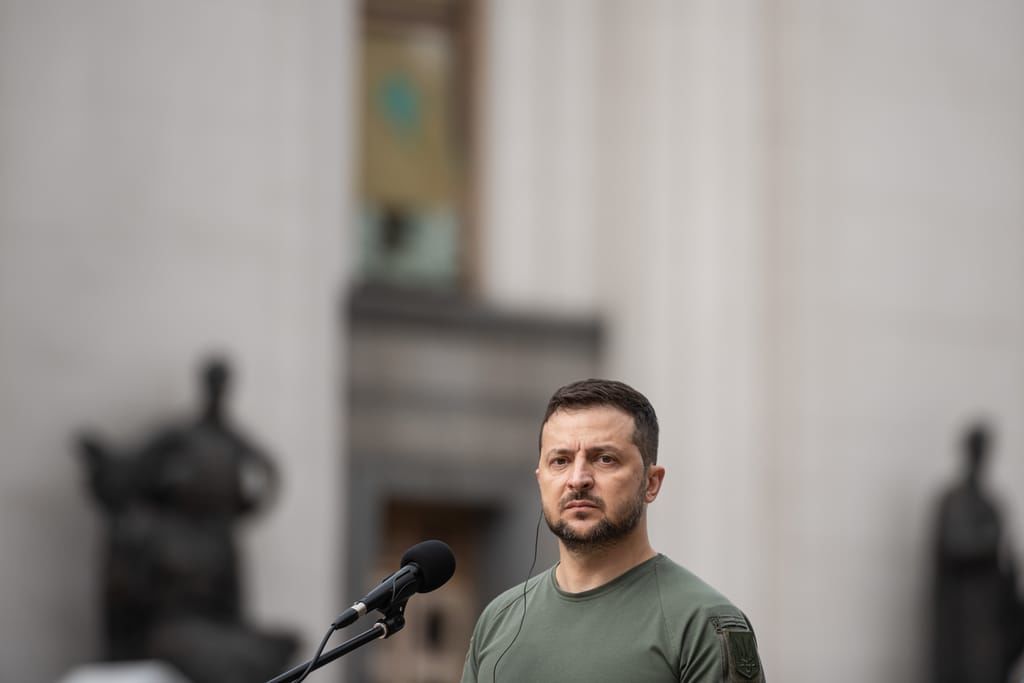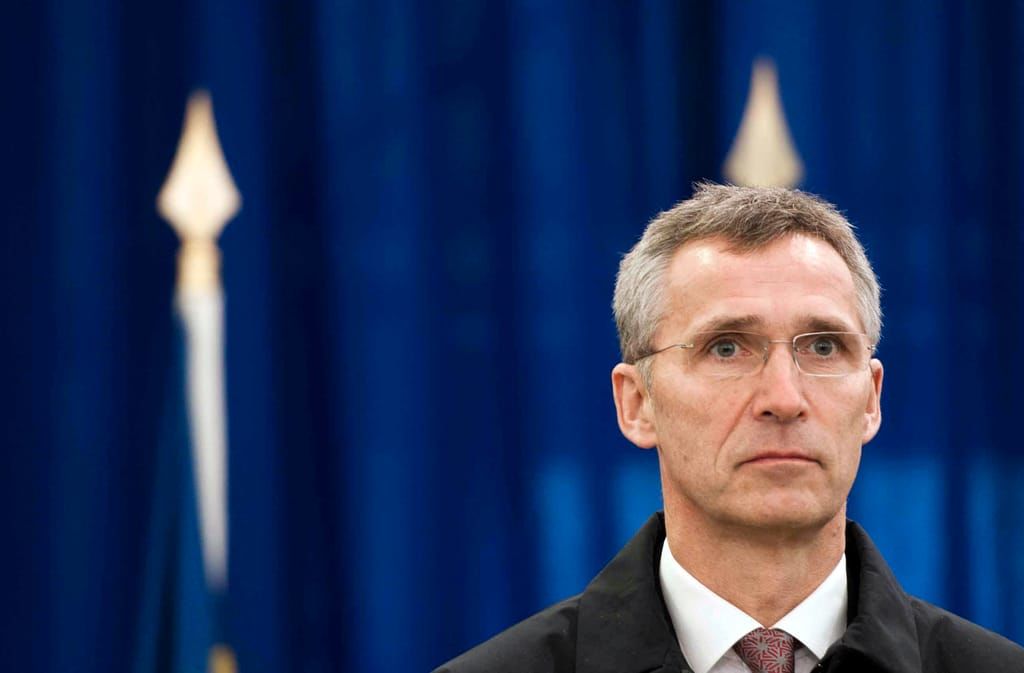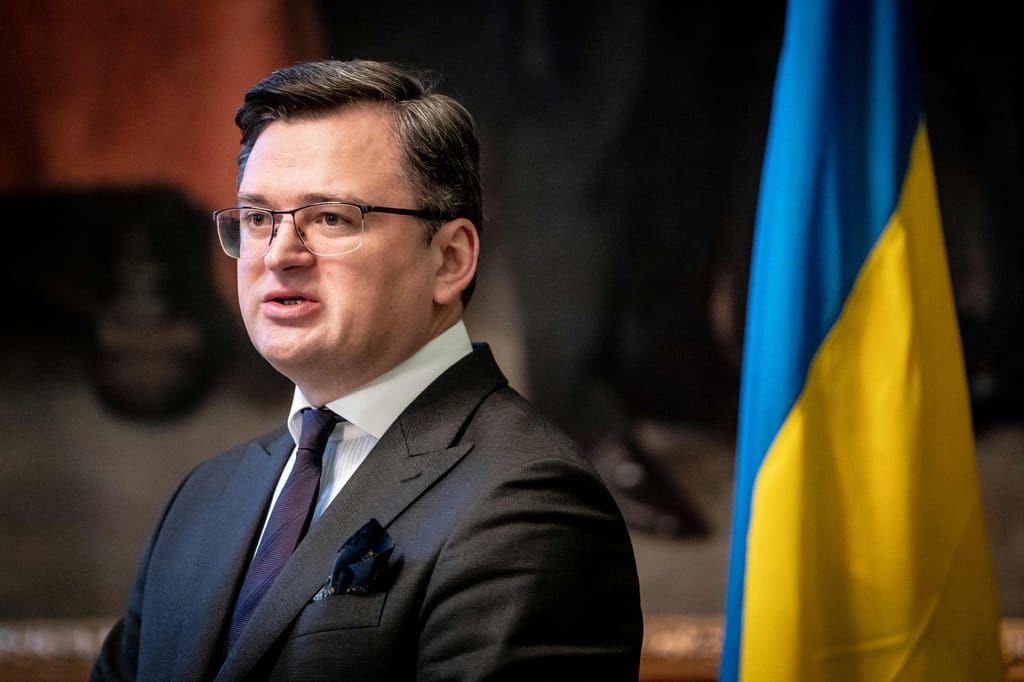
The West’s last war-time taboo: Ukraine joining NATO
For many officials, it’s a topic they won’t touch. When pressed, politicians give memorized, terse and robotic answers.
The verboten subject? Ukraine’s potential NATO membership.
It’s an issue so potentially combustible that many NATO allies try to avoid even talking about it. When Ukraine in September requested an accelerated process to join the military alliance, NATO publicly reiterated its open-door policy but didn’t give a concrete response. And last week, when NATO foreign ministers met, their final statement simply pointed to a vague 2008 pledge that Ukraine would someday join the club.
Not mentioned: Ukraine’s recent request, any concrete steps toward membership or any timeline.
The reasons are manifold. NATO is fractured over how, when (and in a few cases even if) Ukraine should join. Big capitals also don’t want to provoke the Kremlin further, aware of Vladimir Putin’s hyper-sensitivity to NATO’s eastward expansion. And most notably, NATO membership would legally require allies to come to Ukraine’s aid in case of attack — a prospect many won’t broach.
The result is that while Europe and the U.S. have plowed through one taboo after another since Russia invaded Ukraine in February — funneling mountains of lethal military equipment to Kyiv, slapping once unthinkable sanctions on Moscow, defecting from Russian energy — the prospect of Ukraine joining NATO remains the third rail of international politics.
Touching the issue can leave you burned.
French President Emmanuel Macron sparked an outcry over the weekend when he said the West must consider security guarantees for Russia if it returns to the negotiating table — a gesture that enraged Kyiv and appeared to go against NATO’s open-door policy. And behind the scenes, Ukrainian officials themselves faced annoyed colleagues after making their public plea for swift membership.
“Some very good friends of Ukraine are more afraid of a positive reply to Ukraine’s bid for membership in NATO than of providing Ukraine with the most sophisticated weapons,” said Dmytro Kuleba, Ukraine’s foreign minister.
“There are still many psychological barriers that we have to overcome,” he told POLITICO in a recent interview. “The idea of membership is one of them.”
‘De facto’ ally
Ukraine’s leadership has argued that for all intents and purposes, it is already a member of the Western military alliance — and thus deserves a quick path to formal NATO membership.
 “We are de facto allies,” Ukrainian President Volodymyr Zelenskyy declared when announcing his country’s bid to join NATO
“We are de facto allies,” Ukrainian President Volodymyr Zelenskyy declared when announcing his country’s bid to join NATO
“We are de facto allies,” Ukrainian President Volodymyr Zelenskyy declared in September when announcing his country’s bid to join NATO “under an accelerated procedure.”
“De facto, we have already completed our path to NATO. De facto, we have already proven interoperability with the alliance’s standards,” he added. “Ukraine is applying to make it de jure.”
The Ukrainian leader’s statement caught many of Kyiv’s closest partners by surprise — and left several grumbling.
The overture threatened to derail a plan the alliance’s most influential capitals had essentially settled on: Weapons now, membership talk later. It was an approach, they felt, that would deprive Moscow of a pretext to pull NATO directly into the conflict.
In their statement last week, ministers pledged to step up political and practical help for Ukraine while avoiding concrete plans for Kyiv’s future status.
Ultimately, however, few allies question Ukraine’s long-term membership prospects — at least in theory. The divisions are more over how and when the question of Kyiv’s membership should be addressed.
A number of Eastern allies are arguing for a closer political relationship between Ukraine and NATO, and they want a more concrete plan that sets the stage for membership.
“My thinking is that it is basically unavoidable,” said Lithuanian Foreign Minister Gabrielius Landsbergis, “that NATO will have to have a way to accept Ukraine.”
On the other end of the spectrum, France’s Macron wants to take Moscow’s perspective into account.
“One of the essential points we must address — as President [Vladimir] Putin has always said — is the fear that NATO comes right up to its doors, and the deployment of weapons that could threaten Russia,” Macron told French television channel TF1 in an interview released Saturday.
Most other allies essentially evade the subject — not rejecting Ukraine’s NATO dreams but repeating a carefully crafted line about focusing on the current war.
Here’s NATO Secretary-General Jens Stoltenberg’s version, offered last week: “The most immediate and urgent task is to ensure that Ukraine prevails as a sovereign, independent democratic nation in Europe.”
 “The most immediate and urgent task is to ensure that Ukraine prevails
as a sovereign, independent democratic nation in Europe,” said NATO
Secretary-General Jens Stoltenberg
“The most immediate and urgent task is to ensure that Ukraine prevails
as a sovereign, independent democratic nation in Europe,” said NATO
Secretary-General Jens Stoltenberg
And here’s Dutch Foreign Minister Wopke Hoekstra’s take from the same week: “The task here is to make sure that the main thing continues to be the main thing — and that is helping out Ukraine on the battlefield.”
U.S. NATO Ambassador Julianne Smith echoed the point in an interview: “The focus right now is practical support to Ukraine.”
Analysts say the fault line lies between primarily Western European capitals such as Berlin and Paris — which see membership as an ultra-sensitive issue to be avoided at the moment — and some Eastern capitals that see Ukrainian accession as a goal the alliance can begin working toward.
Since the war began, that divide has only become more “exacerbated,” said Ben Schreer, executive director for Europe at the International Institute for Strategic Studies. “Some countries simply don’t want to even have a conversation about this because they feel it might further harden Russian responses.”
Another path
Ukrainian officials do recognize that NATO membership is not imminent, but they still want a gesture from the alliance.
“The ideal scenario would, of course, be a very simple sentence from NATO: ‘OK, we receive your application, we begin the process of considering it.’ That would already be a major milestone achievement,” said Kuleba, Ukraine’s foreign minister, ahead of last week’s meeting.
Smith, the U.S. ambassador, said the Ukrainians are aware they need to do more before they could become members.
Ukraine formally adopted a constitutional amendment in 2019 committing to pursue NATO membership. But even though the country has pursued some reforms over the past few years, experts and partner governments say there’s more Ukraine must do to integrate Kyiv into Western institutions.
“There’s more work to be done, I don’t think that’s a mystery,” said Smith, adding: “I think they’d be the first to tell you that.”
As an interim solution, Kyiv has presented what it calls a pragmatic proposal for Western countries to help protect Ukraine.
“Russia was able to start this war precisely because Ukraine remained in the gray zone — between the Euro-Atlantic world and the Russian imperialism,” Zelenskyy said when presenting a 10-point peace plan in November.
 The West’s “psychological barriers” need to be “overcome by changing the optics” Ukrainian Foreign Minister Dmytro Kuleba said
The West’s “psychological barriers” need to be “overcome by changing the optics” Ukrainian Foreign Minister Dmytro Kuleba said
“So, how can we prevent repetition of Russia’s such aggression against us? We need effective security assurances,” he said, calling for an international conference to sign off on the so-called Kyiv Security Compact, a new set of security guarantees for Ukraine.
But it remains unclear whether Ukraine’s Western partners would be willing to make any legally binding guarantees — or if anything short of NATO’s Article 5 collective defense clause would prove a sufficient deterrent down the line.
“Some of those countries,” said IISS’ Schreer, “would be very reluctant.” Any written security guarantee, he noted, “from their perspective would probably invite strong Russian response, but it also would make them at this point of time part of this conflict.”
A Ukrainian victory, of course, could shift the calculus.
“If Ukraine is stuck in a stalemate, then NATO membership isn’t gonna happen,” said Max Bergmann, director of the Europe program at the Center for Strategic and International Studies. “But if it retakes its territory and accepts its borders — whatever those borders may be, whether it includes Crimea or does not, because that’s the fundamental question for Ukraine — then I think things can move very quickly.”
Asked if he is frustrated with Western partners, Kuleba was blunt.
“I know them too well to be frustrated with them — they are good friends,” he said. “It would be close to impossible for us to sustain the Russian pressure and to prevail on the battleground without them.”
But, the foreign minister added, the West’s “psychological barriers” need to be “overcome by changing the optics.”
Kyiv’s partners, he said, “have to begin to see Ukraine’s membership as an opportunity — and not as a threat.”











